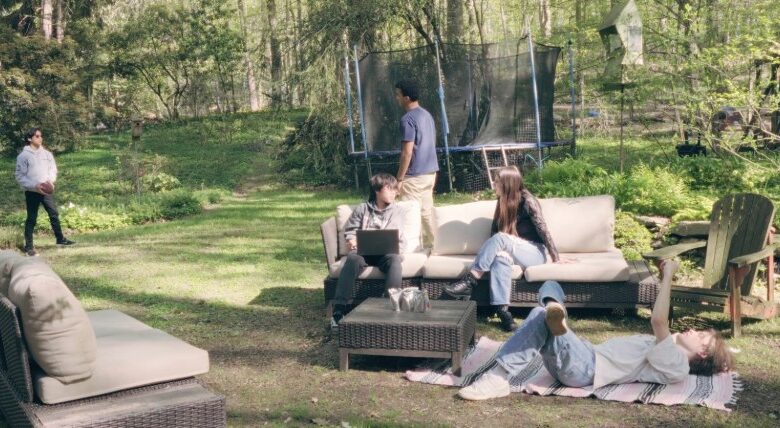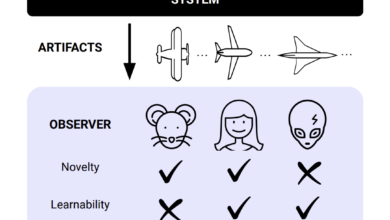Plymouth Whitemarsh High School film club explores artificial intelligence impacts

A scene from “The RoomLink Initiative” which describes the efforts of teens at a fictional high school to update the moral code of the school’s productivity A.I. (Courtesy PW Film Production Club)
Artificial Intelligence is snagging its share of pop headlines these days, from Google’s Gemini vs. OpenAI’s GPT-4o to Netflix “Atlas” heroine Jennifer Lopez vs. bad bot “Harlan.”
Locally, members of Plymouth Whitemarsh High School’s Film Production Club have weighed in on the subject with a new film set to premiere at Montgomery County Community College’s Cultural Center in Blue Bell on June 7 at 6 p.m. “The RoomLink Initiative” describes the efforts of teens at a fictional high school to update the moral code of the school’s productivity A.I. The club’s 20-minute documentary about PW’s 2023-24 cheer team season, “Hitting Zero: PW Cheer,” will precede the screening.
Tickets are $7 online (https://www.ticketleap.events/tickets/pw-film-production/pw-film-2024-premiere) or $10 at the door and include a digital copy of the films. Additional digital are available for $2. More information and ordering details: @PWfilmprod on Instagram.
Current 11th grader Koseli Thakali kickstarted PW’s Film Production Club in 2022. Two years later, the group has also produced “Ace Chemistry,” about student attempts to steal a test’s answer key.
Thakali, who directed “The RoomLink Initiative,” says the movie was inspired by kinks in PW’s new digital hall pass system, the digitalization of the SAT and certain AP tests and the fact that “generative A.I. tools are becoming more apparent in questions of education and ethics.”
“The stakes in high school are rising, and college admissions are becoming more and more competitive,” she continued. “So, we decided to share our take on everything by displaying an A.I. productivity system that has the power to control school infrastructure, hall passes, grades and, ultimately, a student’s future.”
The film’s production process played out in a trio of student-tested “general phases.” According to Thakali, pre-production started with an “ideation process” that typically took place during PW bonus blocks, essentially a given day’s 30-minute open periods.
“Once we have our main idea and plot outline, the head writers split the plot points into scenes,” she said. “Then, we divide the work by assigning scenes to writers (who) write their scenes individually, then submit them to the head writers, who edit the scenes and put them all together to form one cohesive screenplay. This year, we had over 20 writers involved in writing and plotting, with about five acting as head writers.”
Phase two — production — included hosting auditions and casting the film’s six main characters. Filming, the “busiest time of the whole process,” began after winter break in January and wrapped up before AP test season in late April.
“We have a little under four months to film an entire movie, so we try to make the most of our time,” Thakali said. “Immediately, we collect information about our actors’ schedules and create our shoot schedule around that. Then, we have to book locations, find props and costumes and create shot lists. Once our classes end and the bell rings at 2:20 p.m., we only have until 5 p.m. to set up, film, clean up and leave the school.”
The students tackled VFX work as well as cutting, color-grading and sound adjusting during a May-June post-production phase.
“Editing is mostly an individual job, so we assign tasks to our five editors, and once those tasks are completed, their products are reviewed by producers and other editors,” Thakali said.
Following a second review and any necessary tweaking by producers and other editors, “the head of post-production…compiles all the scenes, handles transition work and puts on the finishing touches.”
“Post-production also involves advertising,” Thakali added. “This is when our trailer is put together, the poster is created, and we release cast interviews and BTS content on YouTube and Instagram.”
Even with access to PW’s in-house Colonial Instructional TV equipment, settings and actors and mentoring by club advisor-mass media communications teacher Jonathan Duncan, there were challenges.
“It always comes down to time and money,” Thakali said. “We have nine months to cover all stages of production, (and)…we have to find time between school work, other clubs and personal commitments so that we can film with everyone. If even one actor cannot make it, we cannot film. Most of our film was shot inside the school, but…we only had from 2:20 to 5. Then, we had to be out the door.
“Even when it seems like everything is perfectly planned, something always goes wrong. Either our microphone dies, and we can’t find batteries or an actor has to make up a test after school and is running late. There was one scene this year that we had to reschedule three different times because something always came up.”
Cost-wise, Hollywood take note. The PW film studio budget? “As big as how much we earned in ticket sales last year.”
“Last year, we made $300,” Thakali said. “That budget went toward buying props and a few costumes, but it was far from nearly enough to provide us with good equipment. Last year, we used the school’s camera and microphone equipment, but we soon realized that his limited our growth. The camera and sound quality were lacking, so, instead, we used equipment owned by one of our club members and bought extra supplies using money from our own pockets.”
In the end, Thakali said, “The RoomLink Initiative” is a “somewhat satirical, cautionary tale of the implications of A.I., especially on the education system.” But, she noted, “we also wanted to steer clear of the usual warnings that send the message that technology is inherently evil and that we should stop innovating.”
“We wanted to recognize that technology is not inherently evil and innovation is what drives positive progress in our society. But as humans, we should innovate with more caution than we are currently exercising. That’s what drives positive progress. That’s why we made the solution to our film an update to the A.I. system instead of a de-activation.
“Another minor theme we instilled…related to the pressure of high school. Our main antagonists feel cornered and unable to succeed in the current education system. With the worries of their GPAs and college admissions, they feel uneasy about their future, which is why they turn to A.I. It’s satirically exaggerated, but feelings still stand.”
Completing “The RoomLink Initiative” made her realize “perspective matters.”
“Many of the biggest technological cautionary tales are made by adults, and they focus on the theme that technology is inherently dangerous,” the local teen said. “Many of the biggest films set in high school are also made by adults, and they focus on themes of teenagers wanting to ‘fit in’ and ‘be cool.’ But we wanted to emphasize our own take on positive innovation as well as the feelings surrounding high school that adults often don’t catch.”



